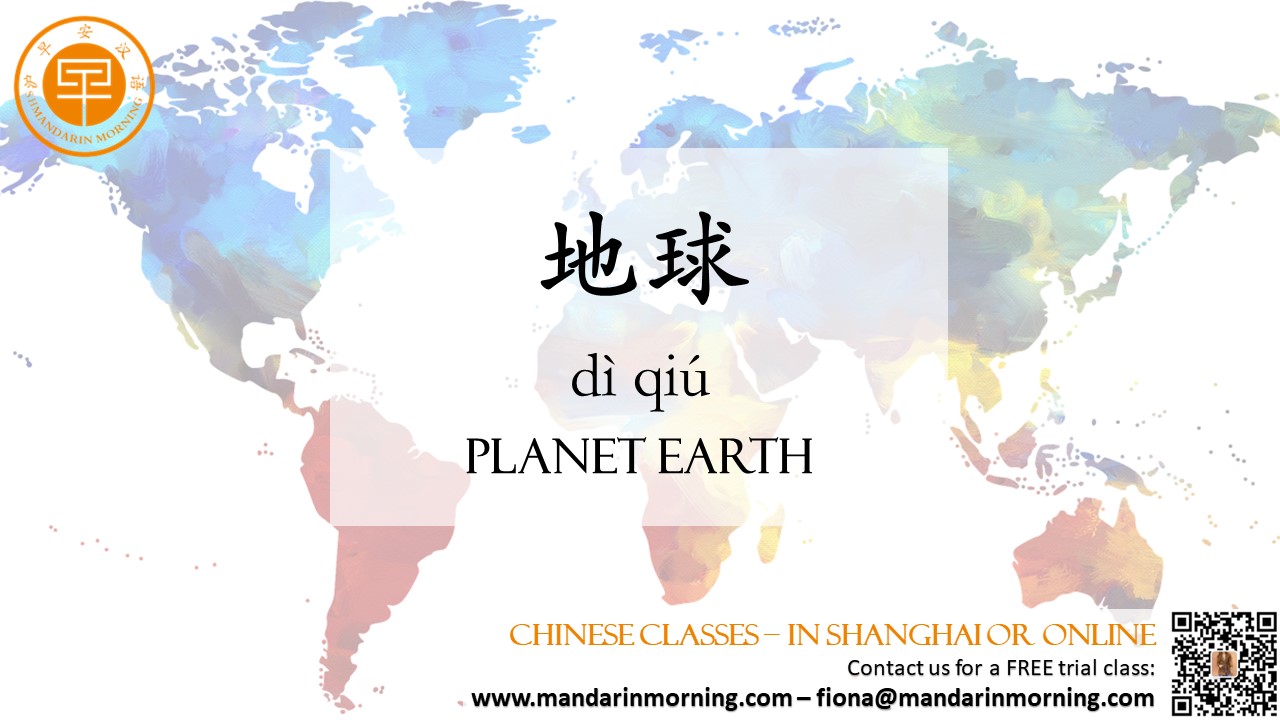【Learn Chinese】10 Important Words about the Earth (Part 1) |
| It’s our responsibility to look after Earth. We need to protect it not just for ourselves and future generations but for every living thing — animals, plants, and the natural world. So, why not get to know our home a bit better? We’ll dive into 10 must-know Chinese words that will connect you more deeply with our wonderful planet Earth.  Planet Earth 地球 The Chinese word for “Earth” is 地球 (dìqiú). 地 (dì) means “earth” or “ground,” and 球 (qiú) means a ball or, in this context, a sphere. Put together, 地球 means the round Earth where we all live. Here’s a simple yet profound sentence using 地球: 我们只有一个地球。 (wǒmen zhǐ yǒu yī ge dìqiú). It’s a reminder of our shared responsibility to cherish and protect our one and only Earth (地球). Moon 月球 Our closest celestial neighbor, the Moon, is known as 月球 (yuè qiú) in Chinese. Here, 月 (yuè) stands for “moon” or “month,” and 球 (qiú) means a sphere – just like 地球 (Earth). But wait, there’s another word for “moon” in Chinese – 月亮 (yuè liàng). This is the word you’ll hear more often. The 亮 (liàng) part of 月亮 means “light” or “bright.” So, how do you know whether to say 月球 or 月亮? Think of 月球 as the Moon as a celestial body and 月亮 as the bright, shining object we see in the night sky. Solar System 太阳系 Ever wonder about our cosmic neighborhood? That’s what we call the Solar System, or 太阳系 (tàiyáng xì) in Chinese. 太阳 (tàiyáng) means “sun,” and 系 (xì) is “system.” So, 太阳系 is literally the “Sun’s system” – the family of planets and other celestial bodies that orbit our bright and powerful Sun. And our Earth (地球; dì qiú) and the Moon (月球; yuè qiú) are just two members. Our Solar system is unique. While it’s true that there are many other star systems with their own planets in our galaxy, our Solar system is the name given specifically to the family of the Sun (太阳; tàiyáng). So, when we look up at the sky, we see just a small part of a huge universe. Our Solar system, with Earth and the Moon, is a special corner in this vast space. Next time you see the stars, think about 太阳系 – our home in the universe. Atmosphere 大气层 Have you ever thought about what keeps us safe from the harshness of space? It’s our planet’s atmosphere, or 大气层 (dàqìcéng) in Chinese. In this term, 大气 (dàqì) means “atmosphere,” and 层 (céng) signifies a “layer.” So, 大气层 is the atmospheric layer that wraps around Earth like a protective blanket. While we all need the Sun (太阳; tàiyáng) for light and warmth, it’s also true that the Sun can be quite harmful because of its ultraviolet solar radiation. In other words, life as we know it wouldn’t be possible without 大气层. The atmosphere filters the sunlight, keeping the dangerous parts out and letting the good, warm light in. Nature 大自然 What word encompasses the beauty of mountains, rivers, forests, and all the stunning landscapes around us? In Chinese, that word is 大自然 (dàzìrán). 大 (dà) translates to “great” or “large,” while 自然 (zìrán) means “nature” or “natural.” Together, they form 大自然, a term that captures the expanse and wonder of the natural world. Interestingly, when 自然 is used on its own, it more often refers to something “natural,” in the sense of being not artificial. On the other hand, 大自然 (dàzìrán) specifically evokes images of the natural world – be it a tranquil forest, a lively river, or a peaceful mountain. |